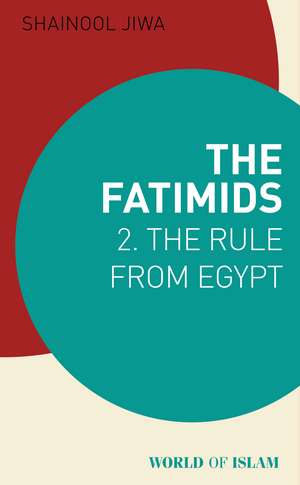The Fatimids 2: The Rule from Egypt: World of Islam
Autor Shainool Jiwaen Limba Engleză Paperback – 25 ian 2023
Preț: 72.56 lei
Nou
Puncte Express: 109
Preț estimativ în valută:
13.88€ • 14.85$ • 11.58£
13.88€ • 14.85$ • 11.58£
Carte disponibilă
Livrare economică 27 martie-10 aprilie
Livrare express 12-18 martie pentru 31.86 lei
Preluare comenzi: 021 569.72.76
Specificații
ISBN-13: 9781780769486
ISBN-10: 1780769482
Pagini: 248
Ilustrații: 30 colour images
Dimensiuni: 111 x 178 x 13 mm
Greutate: 0.45 kg
Editura: Bloomsbury Publishing
Colecția I.B.Tauris
Seria World of Islam
Locul publicării:London, United Kingdom
ISBN-10: 1780769482
Pagini: 248
Ilustrații: 30 colour images
Dimensiuni: 111 x 178 x 13 mm
Greutate: 0.45 kg
Editura: Bloomsbury Publishing
Colecția I.B.Tauris
Seria World of Islam
Locul publicării:London, United Kingdom
Caracteristici
The World of Islam series offers the only accessible guides for general readers about this renowned dynasty
Notă biografică
Shainool Jiwa is Senior Research Fellow at the Institute of Ismaili Studies, London, UK and has lectured and published on Fatimid Studies for over three decades. She has published The Fatimids 1: The Rise of a Muslim Empire (2018) and co-edited The Shi'i World: Pathways in Tradition and Modernity (2015) and The Fatimid Caliphate: Diversity of Traditions (2017) as well as translating key medieval Arabic texts relating to Fatimid history. She holds a PhD from the University of Edinburgh, UK.
Cuprins
IntroductionChapter One: The Arrival of the Fatimids in Egypt Chapter Two: The Cosmopolitanism of EmpireChapter Three: The Pillars of Justice and LawChapter Four: Public Life and Learning in Cairo Chapter Five: The Empire of the SeasChapter Six: Fluctuations of Fatimid Rule Chapter Seven: The Heirs of EmpireConclusion: Glimpses of the Fatimid Legacy
Recenzii
Pithy, comprehensive and clearly expressed, this book brings together diverse strands of Fatimid cultural, religious and political history in a cohesive account. Books that speak to both general readers and experts are rare in academia. In achieving this feat with erudition and aplomb, Jiwa's book is an invaluable addition to the library of Fatimid studies.
Having founded Cairo in 969, the Fatimids inaugurated an age marked by tolerance as well as brilliance in artistic and learning patronage. Dealing with the vicissitudes of the Fatimids and their empire, this book covers a lot of ground in a succinct, accessible way without compromising on academic rigour.
This is an accessible volume from a leading scholar in the field of Fatimid studies. Based on primary sources research and including images and maps that will help readers understand the two centuries of Fatimid presence in Egypt, alongside The Fatimids 1. The Rise of a Muslim Empire, it forms a two-volume complete history of the only sustained Mediterranean Shi'i caliphate
The book was difficult to put down . The author has woven a clear yet complex tapestry of fascinating human stories drawing upon political and religious, as well as cultural history, that engagingly reveal the quality and range of the intellectual and artistic patronage extended by these rulers in creating the cultural wonder that was the Fatimid Empire.
Having founded Cairo in 969, the Fatimids inaugurated an age marked by tolerance as well as brilliance in artistic and learning patronage. Dealing with the vicissitudes of the Fatimids and their empire, this book covers a lot of ground in a succinct, accessible way without compromising on academic rigour.
This is an accessible volume from a leading scholar in the field of Fatimid studies. Based on primary sources research and including images and maps that will help readers understand the two centuries of Fatimid presence in Egypt, alongside The Fatimids 1. The Rise of a Muslim Empire, it forms a two-volume complete history of the only sustained Mediterranean Shi'i caliphate
The book was difficult to put down . The author has woven a clear yet complex tapestry of fascinating human stories drawing upon political and religious, as well as cultural history, that engagingly reveal the quality and range of the intellectual and artistic patronage extended by these rulers in creating the cultural wonder that was the Fatimid Empire.



